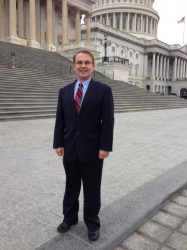By Margie Glick

While the nation buzzed in anticipation of the State of the Union, engineering deans from across the country came to Washington D.C. for the annual American Society of Engineering Education (ASEE) public policy colloquium. Vanderbilt University School of Engineering Dean Philippe Fauchet attended this conference which focused on the most pressing federal policies impacting higher education and federally funded research. While the top concern expressed by speakers and attendees alike at the conference related to the impending across-the-board-cuts scheduled to take effect in March, the need to strengthen our investment in the entire P-20 STEM pipeline and the importance of promoting advanced manufacturing was squarely in the center of the discussion.
The ASEE conference was held in advance of a federal advocacy day. On Wednesday, the deans were provided with the opportunity to meet with members of their home-state delegations about federal policies that impact their schools. Dean Fauchet, accompanied by Dean Wayne Davis of the University of Tennessee-Knoxville and Dean Joseph Rencis of Tennessee Tech University spent the day meeting staff members from Senator Lamar Alexander, Senator Bob Corker, Congressman Jim Cooper, Congressman Diane Black and Congressman Chuck Fleischmann’s offices.
During these meetings, Dean Fauchet expressed his concerns regarding the pending budget cuts which would reduce federal funds by at least five percent beginning March 1 should Congress not pass a law to override them. Dean Fauchet highlighted the strong economic impact graduates with degrees in engineering have on our local and national economy. He mentioned how it is not uncommon for spin-off companies like Neurotargeting or breakthrough technologies like this bionic leg demonstrated by an amputee who used it to take the stairs all the way up to the top of Chicago’s Willis Tower to get their start at Vanderbilt with the help of federal investments. It is through these innovative companies and products that Vanderbilt and the nation will be able to remain globally competitive for years to come.
All of the congressional offices acknowledged the economic importance of engineering and a need for investment in federal research agencies like the National Science Foundation, the Department of Energy, the Department of Defense and the National Institutes of Health. They also acknowledged that indiscriminate budget cuts could be harmful to engineering research and education programs. Unfortunately, it still seems unlikely that we will see a bipartisan agreement emerge to avoid these devastating cuts in advance of the March 1 deadline.
Margie Glick is assistant director of federal relations for Vanderbilt University.